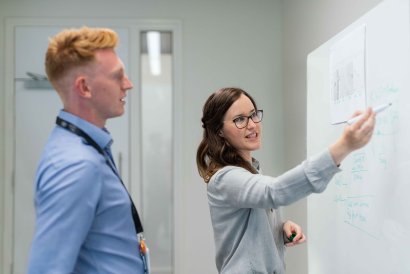“Crash MBA” Course
This live course is designed for professional engineers & technical managers.
Course Description
Engineers cannot see their designs come to fruition, take shape, and be implemented without the necessary funds. Most engineering curricula do not include significant financial analysis and engineering economics. This course fills that gap. In this course, you learn about finance, engineering economics and corporate reporting requirements. Engineers need to objectively and quantitatively show their clients and employers the advantages and disadvantages of engineering design options to meet the 2nd Code of Engineering Ethics requirement for all Licensed Professional Engineers.
A “Crash MBA” Course for Engineers, Professionals, and Managers, this course is themed after a book published by the instructor, Professor S. Bobby Rauf, titled: "Finance and Accounting for Energy Engineers.”
Let Us Guide You!
Learn more about how Finance and Engineering Economics for Engineers can help you in your career!
Why Choose this Course?
In this course, you learn to perform time value of money calculations using equations or financial factor tables explained in a simple and easy to understand way, and illustrated through practical examples. You will learn asset depreciation methods and their influence on net profit and taxes. Learn about the widely used and accepted capital investment performance metrics, such as financial ratios, payback period, breakeven, and NPV, etc. You learn about fundamental accounting methods: the Income Statement and the Balance Sheet. You will get an appreciation of the role played by inventory systems in the control of net income, net profits and tax liability. Life cycle cost and other cost classifications in industrial and commercial organizations are covered.
Professor S. Bobby Rauf is a highly esteemed instructor and author who brings extensive professional and consulting experience to the classroom. He is certified to instruct various engineering, ergonomics, and industrial safety courses. He has conducted certification training and trained engineers for Professional Engineering licensure exams in the United States, the UK, Saudi Arabia, the Netherlands, and Ukraine.
During his career as a Senior Staff Engineer, he developed and maintained energy and ergonomics programs for multiple manufacturing plants in the US and overseas. He also provided consultation and training services in energy, electrical engineering, industrial safety, ergonomics and arc flash arena. His extensive engineering experience includes power design, control system design, project management, process management, energy and utilities management, energy audits/assessments, plant maintenance, robotics, manufacturing automation, HVAC audits, and design of ergonomic equipment.
This course is designed for engineers, professional engineers, energy professionals, engineering managers, technical professionals, facilities managers and other professionals who are not intimately familiar or current on finance, accounting, time value of money analysis, and engineering economics principles and practices.
In this course, you learn to perform time value of money calculations using equations or financial factor tables explained in a simple and easy to understand way, and illustrated through practical examples. You will learn asset depreciation methods and their influence on net profit and taxes. Learn about the widely used and accepted capital investment performance metrics, such as financial ratios, payback period, breakeven, and NPV, etc. You learn about fundamental accounting methods: the Income Statement and the Balance Sheet. You will get an appreciation of the role played by inventory systems in the control of net income, net profits and tax liability. Life cycle cost and other cost classifications in industrial and commercial organizations are covered.
Professor S. Bobby Rauf is a highly esteemed instructor and author who brings extensive professional and consulting experience to the classroom. He is certified to instruct various engineering, ergonomics, and industrial safety courses. He has conducted certification training and trained engineers for Professional Engineering licensure exams in the United States, the UK, Saudi Arabia, the Netherlands, and Ukraine.
During his career as a Senior Staff Engineer, he developed and maintained energy and ergonomics programs for multiple manufacturing plants in the US and overseas. He also provided consultation and training services in energy, electrical engineering, industrial safety, ergonomics and arc flash arena. His extensive engineering experience includes power design, control system design, project management, process management, energy and utilities management, energy audits/assessments, plant maintenance, robotics, manufacturing automation, HVAC audits, and design of ergonomic equipment.
This course is designed for engineers, professional engineers, energy professionals, engineering managers, technical professionals, facilities managers and other professionals who are not intimately familiar or current on finance, accounting, time value of money analysis, and engineering economics principles and practices.
Course Information
- Professional Engineers
- Manufacturing Managers
- Facility Managers
- Project and Program Managers
- Maintenance Managers
- Energy Engineers and other Energy Professionals
- Engineering Managers
- Construction Managers
- Architects
In just one 8-hour day on the ODU campus or via Zoom, you will be refreshed on and understand finance, engineering economics, and accounting concepts through an explanation of definitions and examples of calculations. You will also understand basic economics principles and engineering economics-related analyses, know more about common organizational structures, and understand the role of Financial Analysts, Accountants, Controllers, and CFOs.
Participants are kept engaged through questions and answers, discussions, and classwork. Board acceptance guarantee.
Professor S. Bobby Rauf, PE, CEM, CMT, CE, MBA
Professor S. Bobby Rauf is the President, Chief Consultant and Senior Instructor at Sem-Train, LLC. Bobby has over 25 years of experience in teaching undergraduate and post-graduate Engineering, Math, Business Administration, and MBA courses, seminars, and workshops. Professor Rauf is a registered (PE) Professional Engineer, in the States of Virginia, North Carolina, and Wyoming and is a Certified Energy Manager (CEM) and a Certified Ergonomist (CE). He holds memberships in the Association of Energy Engineers (AEE), the National Society of Professional Engineers (NSPE), and the American Society of Engineering Education (ASEE).
Professor Rauf was inducted as “Legend in Energy” by AEE, in 2014. He is a published author of multiple engineering and energy books and professional development courses. He holds a patent in process controls technology.
Professor Rauf is certified to instruct various engineering, ergonomics, and industrial safety courses. He has conducted certification training and trained engineers for Professional Engineering licensure exams in the United States, The United Kingdom, Kingdom of Saudi Arabia, The Netherlands and Ukraine, over the past ten years.
Join our Next Class!
Cancellation Policy
To withdraw from a course you must send a request in writing to cepd@odu.edu seven (7) days prior to the start date of the course. Failure to attend a course does not constitute withdrawal. Course registration fees, less a $50 processing fee will be refunded via the original form of payment. There are no refunds once the class has begun. Late withdrawals of six (6) days or less before the class begins, will result in the student being charged the $50 processing fee, as well as charges for books and/or other course material fees.




